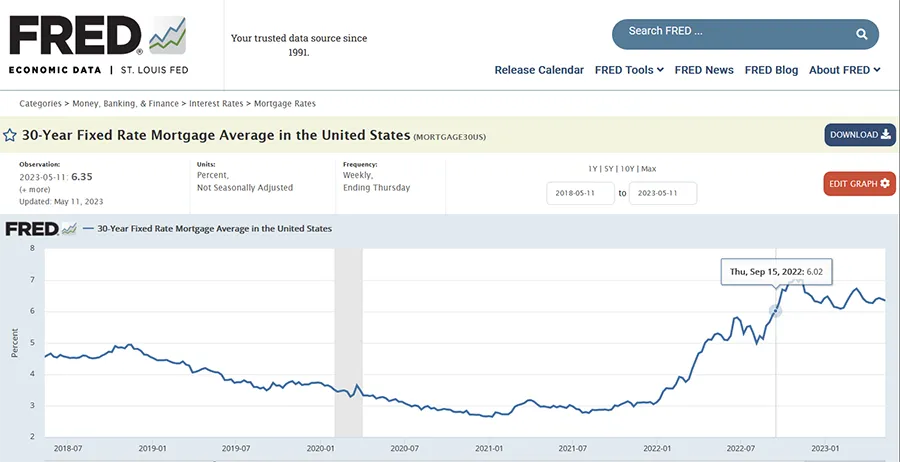Home Interest Rates Are Stuck. Your Credit Score Is More Important Than Ever.
Posted on 15 May, 2023 by MIRANDA BOTTAS in Finance

It's been over a year now since the average 30-year fixed mortgage's interest rate broke above (and has remained over) 5%. And today marks exactly 8 months straight since it crossed above 6% without looking back or dipping below - even for a minute. Despite all the increases and decreases that have occurred since September of last year, it's now becoming quite clear to anyone paying attention that "waiting for a better time to buy" is a somewhat futile endeavor.
Whether it was overly high hopes, simple miscalculations or other external factors that came into play (which they always seem to do, such as the recent and now ongoing bank collapses - just to name one problem) there really hasn't been much to see in the overall outlook for the housing market.
From excuses and promises, to reasoning and statistics about where we'd be sitting at this point in time, the grand majority of the news, predictions, and expert opinions were far from correct. In fact, they were completely incorrect. From late October of last year to early November, average 30-year mortgage rates peaked out at an incredible 7.08% according to Federal Reserve Economic Data (FRED). During this time, many would-be buyers put their plans on hold while prices were at all-time highs and availability was dropping as the uncertainty caused many sellers to remove their homes from the market.

The image above shows the average 30-year rate for mortgage interest. Thursday Sept, 15th (as marked) clearly displays the 6% range until today, showing that we've been stuck above 6% for 8 months. That's a lot longer than most people imagined. Data comes directly from FRED historical charts.
There were many doubts and various negative metrics responsible for all sorts of chaos in the housing market, somewhat paralyzing it in many ways. In our opinion, one of the major factors was although demand was up and many home sellers could have made record profits, they would be facing higher prices when they went back to buy something else. In other words, the opportunity to sell high was there, but the opportunity to use that extra cash to upgrade to a bigger and better home was not. There's no point in selling high if you can't buy something better. This means that most of the people who were selling could afford to because they either owned a lot of real estate or were simply selling extra properties, not selling their primary home.
A very, very large number of Americans were told, had expected, and genuinely believed that interest rates to fall drastically by spring, allowing them to lock in much better interest rates as the housing market settled down and fell back to normal. Again, we can see that this is not the case. While writing this, the average 30-year is 6.35% which is definitely much lower than the 7%+ we saw at last years peak, but we are not seeing definitive signs of slowing. More so, we're absolutely not seeing any signs of falling back into the 3% or 4% interest range that so many cheerfully expected would happen by summer.
What we do know is that there were more FED interest rate hikes than expected in a "battle to curb inflation". Whether it worked as planned or not is yet to be seen. Many sources are throwing out ideas, numbers and statistics that show the rate of inflation's increase is slowing, however, prices are still inflating. Explained in a easier to understand fashion, prices are still going up - just at a slower pace. That's a good thing, but it doesn't prove anything concrete. Whether or not the FED will pause rate hikes is anyone's guess, and how the last year of changes will affect the second half of this year and the begging of 2024 is uncertain at best. To be safe and smart, it's probably best to have very low expectations for any truly favorable change.
One thing we've learned by paying close attention to what's happened over the past year and what's currently happening is that nothing really panned out as it was supposed to. We're still falling far behind on the official time frames we'd been given for the housing market to bear some fruits in favor of the home buyer, as well as overall general economic expectations of consumers, business owners, and workers.
It's worth a mention that the stock market itself is not being calculated in our economic considerations at all because at the moment (and over the last year at least) it literally defies all realistic explanation when compared to the numbers that it should correspond with. There is a key factor that always makes the stock market go higher, and that is ever-increasing creation of new debt. The stock market seems to love new debt and it's happening at a rate that's difficult to keep tabs on, let alone comprehend.
What Does This Have To Do With My Credit Score?
To answer simply..... everything. Your credit score is your key to survival, success, and strength during difficult financial times - even if you are not personally suffering financially. If you'd like to understand this better, keep reading.
When interest rates rise, your credit card payments rise. Your vehicle payment may rise. Your mortgage rate - even if you've already bought your home years ago - may fluctuate if it's not fixed. The rising cost of goods brought on from inflationary factors combined with lenders tightening their reigns on everything from businesses loans to personal credit requirements means one way or another you're going to be spending more.
Now, let's understand how having a better credit score is a counter-active solution to these problematic situations.
A Better Credit Score Means Better Opportunities
Hands-down, this in not just an opinion. We've covered this time and time again. It's a fact that the better your credit is, the more financial opportunities you'll have. You'll get better loans, better interest rates, larger loans, higher credit card limits, cards with enhanced perks, and it can even make-or-break your ability to get a job or rent a home or business space. If you can't see how a better credit score can easily translate into the possibility for more income and an overall better quality of life, we probably cannot help you out. On the other hand, if you're interested in finding the best pathway through this current financial maze in what is apparently considered to be the "new normal", we have some interesting information that might help you out.
If you buy tradelines, you can increase your credit score quickly and easily. Paired with a little planning and some strategic timing, you can lock the best financing possible at any given moment in time. How would another 50 points look for a mortgage lender when they take a peek at your credit report? How about an extra 150 points? What would that kind of number added to your already good credit score equate to in regards to the amount of money you could save on a 20 or 30-year mortgage loan based on interest alone? A lot of money is the proper answer. More than most people would like to admit.
If you're preparing to buy a home and are tired of waiting, you already know that interest rates are stuck in a general area that doesn't sit well with anyone. However, don't make the mistake of jumping in to the situation without first knowing what you're up against.
Optimize your credit score with authorized user tradelines now to help ensure a minimal interest rate, and improved repayment terms. Not only can you save money on interest, but you can get what you're after with less money down, which means more money in your pocket - and that's always a good thing!

PREVIOUS ARTICLE
The Top 10 Most Important Questions About Tradelines: Answered
NEXT ARTICLE
The Biggest Credit Repair Scam And How To Avoid It
